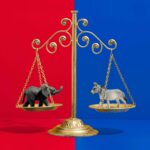When it comes to consumer products, luxury is nothing new. In fact, many of the major luxury legacy brands we know today, such as Chanel, Dior, and Armani, have been around for decades – if not longer. Currently, personal luxury goods make up a market of more than $300 billion. However, in recent years, the luxury cosmetics market has been expanding, estimated at more than $60 billion and growing. So, what is our collective relationship to luxury beauty, and what trends can we anticipate in the near future?
A Look at Luxury Beauty Buyers in the US
As the data show, 67% of U.S. adults who purchase beauty products are likely to buy at least one type of luxury beauty product. Fragrance tends to be the most popular item to purchase from a luxury brand, with 27% of U.S. beauty buyers opting for an expensive scent. This is followed by facial skincare (25%), hair care (24%), and makeup (19%).
Celebrity-Owned Beauty Brands Win With Gen Z
Celebrities, in particular, have been eager to jump onto the luxury beauty trend, creating eponymous brands to extend their reach – and earnings – even further. High-profile brands include Fenty Beauty by Rihanna, Lady Gaga’s Haus Labs, and Kylie Jenner’s Kylie Cosmetics. Sixty-one percent of U.S. adults are familiar with celebrity brands and data show they are increasingly popular. Among the aware, 17% of respondents have purchased something from a celebrity-owned company and 10% intend to do so.
These brands are most popular among adults aged 18-24 – 46% have purchased them, while 22% intend to – as well as among women and non-binary respondents. There’s also a clear connection between celebrity cosmetics and social media influencers. Currently, 73% of those who have purchased celebrity-owned makeup have also been influenced to make a purchase due to a social media influencer’s recommendation.
Of course, different celebrity brands garner different levels of support, which could impact market reach. Looking at some of the top celebrity-owned brands today, 75% of celebrity-brand beauty buyers who say they are likely to purchase these products again identify as Lady Gaga and Alicia Keys fans, followed by Rihanna (59%), Jennifer Anniston (54%), and Kylie Jenner (48%) fans.
Why Opt for Luxury? The Wellness Factor
What inspires consumers to take out their wallets for a luxury item? Luxury cosmetics typically offer premium ingredients and packaging, retailing for twice as much as the beauty category on average. Yet even with inflation, steep prices aren’t keeping U.S. consumers from making prestige/luxury beauty purchases, especially in the hair care and fragrance categories. It’s posited that spending on prestige/luxury cosmetic products may serve as a form of wellness and self-care.
It’s possible that, for some, a luxury purchase is considered a splurge. After all, since the majority of Americans do splurge on something, there’s plenty of reason to believe that treating oneself is reason enough to opt for luxury. People who purchase luxury cosmetics are more likely than the Gen Pop to ‘splurge’ on a luxury designer good or self-care experiences, including physical pampering and an expensive meal.
This is further reiterated by the fact that 23% of Americans view shopping as self-care, which is seven points higher among luxury beauty users. So while the self-care purchase might not always be luxury, the gap between luxury and non-luxury purchases could be narrowing.
Between the influence of social media, the desire to treat oneself to something special, and the perennial social interest in beauty, the market for luxury cosmetics seems poised for growth. The only question that remains is, amidst economic volatility and ever-increasing prices, can luxury cosmetics last for the long-term?
Additional Insights from the CivicScience InsightStore:
- More than 4-in-10 luxury beauty users value brand over price when shopping for health and beauty products, while just 23% of non-luxury beauty buyers say the same.
- A total of 73% of recent Sephora shoppers say they have purchased celebrity-owned beauty brands before, compared to 66% of Ulta shoppers and 45% of Macy’s shoppers.
- Skin care is a top category for celebrity-brand users – 49% say they are ‘very passionate’ about skin care, more so than hair care (41%) and makeup (38%).
- Americans planning to do the majority of their holiday gift shopping at specialty chain stores (Gap, Best Buy, etc.) this year are the most likely to be luxury and celebrity-brand beauty buyers.








